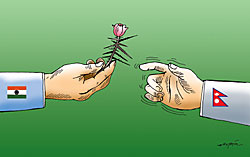 ROBIN SAYAMI |
The position of the Indian ambassador in Nepal is part diplomatic, part political, which means that he (it has always been a he) has to be discreet and flamboyant at the same time.
Reticence of South Block and resentment in Singha Darbar notwithstanding, Indian interference in the internal affairs of Nepal is a reality. But the current Indian envoy has broken all past records in commuting between Lainchaur and Baluwatar. With the result that a Nepali prime minister has cited foreign intervention as one of the main reasons for his resignation.
The Indian propaganda machinery has since marshaled its considerable resources to counter Caretaker Prime Minister Pushpa Kamal Dahal's allegations that can neither be confirmed nor denied. Ironically, Dahal's accusations carry considerable weight in Nepal precisely because he is believed to have been closer to the South Block than any other previous prime minister.
The meddling has been so blatant in the past few months that Indian damage control measures don't seem to be working. They must be quite desperate over there to think that they can micromanage power-starved Kathmandu's affairs from their air-conditioned Lutyens bungalows in New Delhi. In an attempt to shore up the acceptability of communist Madhab Kumar Nepal in capitalist New Delhi, a phoney story was put out that the forefathers of the leftist leader from Rautahat actually came from somewhere in Bihar.
The second piece of speculation proved to be even more ephemeral. When the Indian media speculated that Dahal might have been prompted by the Chinese to dismiss CoAS Rookmangud Katawal, the Chinese Foreign Ministry spokesperson Ma Zhaoxu immediately issued a terse statement from Beijing: "The Chinese government always adheres to the principle of non-interference in the internal affairs of other countries." Translation: Others too will do well to emulate Beijing's policy towards Kathmandu.
Apparently whoever forms the next government in Singha Darbar will be under pressure to prove that it's not beholden to foreign benefactors. It's difficult to imagine a more spectacular failure of Indian foreign policy in Nepal. The Maoists have reinvented the theory of Panchayat pedagogues that patriotism in Nepal begins and ends with anti-Indian sloganeering in the streets. New Delhi's material and intellectual investment in the grooming of Maoists seems now to have evaporated.
In their eagerness to oust the monarchy and teach mainstream parties a lesson in 'pragmatic' foreign policy, some Indian theorists went overboard with their open support for leftist insurgents. They probably believed the Maoist leadership would remain beholden and give India more play in Kathmandu than democratic politicians. This assumption was fundamentally flawed: just as it's difficult for an anti-Indian political force to survive for long in Singha Darbar, no Nepali politician can survive without at least keeping up the appearance of being against Indian hegemony.
So far, the Maoist supremo has played his cards well. Some may find the Shaktikhor video damning for the Maoists, but its dissemination has helped raise Dahal's reputation to the level of master manipulator in the eyes
of his flock.
Dahal's apparent helplessness in the face of the combined efforts of "national and foreign elements" to force Maoists out of peaceful politics too appears to be having desired effects. His fractious rank and file have suddenly found a cause to rally behind their besieged leader.
The propaganda mileage Maoists can draw against the parliamentary system if a person roundly defeated from two constituencies becomes the premier with the support of their 'class enemies' might have prompted Dahal to play victim. "Even though you are competent, appear to be incompetent. Though effective, appear to be ineffective," says Sun Tzu in The Art of War. The game might ultimately go in the favour of Indian strategists. In propaganda wars, fortune favours the one with the bigger fortune. But for now Dahal clearly has an edge over his former handlers in the Indian capital.



